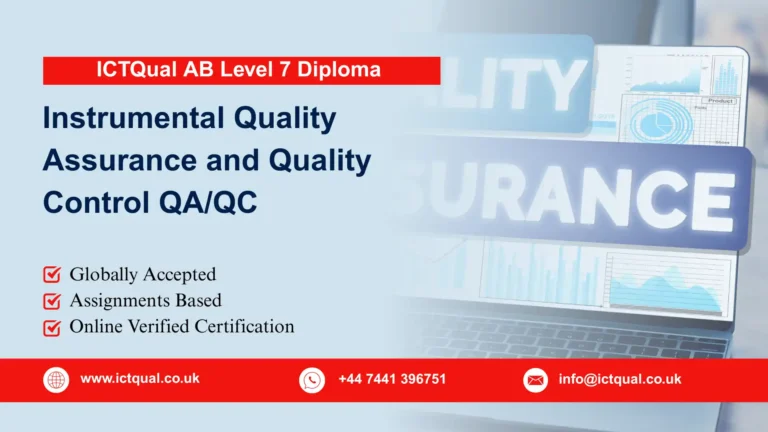In today’s dynamic educational landscape, the role of educators and trainers is more crucial than ever. Whether you’re involved in teaching, training, or instructional design, advancing your skills and knowledge can make a significant impact on your effectiveness and career growth.
The Qualifi Level 5 Diploma in Education and Training is designed to empower educators by providing them with the expertise needed to excel in these roles.
The Qualifi Level 5 Diploma in Education and Training is an advanced qualification aimed at enhancing the skills and knowledge of professionals in the education and training sectors.
This course is designed for those who wish to deepen their understanding of educational theories, teaching methodologies, and assessment techniques.
It covers a broad range of topics, including curriculum design, learner engagement, teaching strategies, and reflective practice.
The diploma provides both theoretical insights and practical applications, equipping educators and trainers to deliver high-quality instruction and support learner development effectively.
he Qualifi Level 5 Diploma in Education and Training is a transformative qualification that empowers educators and trainers to excel in their roles and advance their careers.
By combining advanced theoretical knowledge with practical skills, this diploma prepares professionals to deliver high-quality education and training, lead effectively, and contribute to the development of innovative learning environments.
Whether you are looking to enhance your teaching practice, step into leadership roles, or transition into a new career in education, this diploma offers the tools and expertise needed to achieve your goals and make a meaningful impact in the field of education and training.
The Qualifi Level 5 Diploma in Education and Training is a comprehensive qualification designed to advance the skills and knowledge of professionals in the education and training sectors. This course provides a deep dive into educational theories, effective teaching methodologies, and assessment techniques, equipping learners with the expertise to enhance their instructional practice.
Covering key areas such as curriculum design, learner engagement, and reflective practice, the diploma combines theoretical insights with practical applications. It aims to prepare educators and trainers for leadership roles, improve their teaching effectiveness, and support their professional development, making it a valuable credential for those seeking to advance their careers in education and training.
The Qualifi Level 5 Diploma in Education and Training qualification consists of 4 mandatory units and 8 optional units making a combined total of 120 credits for the completed qualification.
Mandatory Units
| Sr# | Unit Title |
|---|---|
| 1 | Theories, Principles and Models in Education and Training |
| 2 | Teaching, Learning and Assessment in Education and Training |
| 3 | Developing Teaching, Learning and Assessment in Education and Training |
| 4 | Professional Practice in Education and Training |
Mandatory Units
| Sr# | Unit Title |
|---|---|
| 1 | Action Research |
| 2 | Develop and Prepare Resources for Learning and Development |
| 3 | Developing, using and organising resources in a specialist area |
| 4 | Equality and Diversity |
| 5 | Inclusive Practice |
| 6 | Internally Assure the Quality of Assessment |
| 7 | Manage Learning and Development in Groups |
| 8 | Understanding the Principles and Practices of Internally Assuring the Quality of Assessment |
The Qualifi Level 5 Diploma in Education and Training is tailored for a diverse range of professionals within the education and training sectors who are looking to deepen their expertise and enhance their career prospects. This course is ideal for:
1. Current Educators and Trainers
Professionals already working in educational environments, such as teachers, trainers, or facilitators, who wish to advance their skills and knowledge. The diploma provides an opportunity to refine their teaching methods, improve their leadership capabilities, and stay updated with current educational practices.
2. Instructional Designers
Individuals involved in designing and developing educational programs and training materials. The diploma equips them with advanced skills in curriculum development and instructional design, enabling them to create more effective and engaging learning experiences.
3. Educational Leaders and Managers
Those in or aspiring to leadership positions within educational institutions or training organizations. This includes roles such as department heads, program managers, or educational consultants who need to develop strategic planning, management, and leadership skills.
4. Career Changers
Professionals from other fields who are looking to transition into the education and training sector. The diploma provides the foundational knowledge and practical skills required for a successful career change, making it easier to enter and excel in the field of education.
5. Recent Graduates
Individuals with degrees in education or related fields who seek to specialize further in education and training. The diploma offers advanced training and practical experience, enhancing their qualifications and improving their employability in competitive job markets.
6. Aspiring Trainers and Educators
Those aiming to become professional trainers or educators who need a solid understanding of teaching practices, curriculum design, and learner engagement. The diploma provides a comprehensive foundation for starting a career in education and training.
Upon successful completion of the Qualifi Level 5 Diploma in Education and Training, learners will achieve the following outcomes:
1. Advanced Knowledge of Educational Theories and Practices
- In-Depth Understanding: Demonstrate a comprehensive understanding of contemporary educational theories, principles, and practices.
- Application: Apply these theories to design and implement effective teaching strategies that enhance learning outcomes.
2. Expertise in Curriculum Design and Development
- Curriculum Creation: Develop and create well-structured, engaging, and inclusive curricula tailored to diverse learner needs and educational goals.
- Resource Utilization: Use various educational resources and technologies to support and enrich the learning experience.
3. Effective Teaching and Training Techniques
- Teaching Strategies: Employ innovative and effective teaching methods to engage learners, facilitate active participation, and cater to different learning styles.
- Classroom Management: Implement strategies for managing classroom dynamics, fostering a positive learning environment, and addressing behavioral issues.
4. Proficient Assessment and Evaluation Skills
- Assessment Methods: Utilize a range of assessment techniques to evaluate learner progress, identify areas for improvement, and provide constructive feedback.
- Evaluation: Analyze assessment data to adjust teaching approaches, ensuring that learning objectives are met and adapted to individual learner needs.
5. Leadership and Management Competencies
- Leadership Skills: Develop leadership skills to effectively manage and motivate teams within educational settings, including supervising staff and mentoring colleagues.
- Management: Demonstrate competence in managing educational programs, including strategic planning, resource allocation, and organizational development.
6. Reflective Practice and Professional Development
- Reflective Practice: Engage in reflective practice to continuously evaluate and improve teaching methods, professional skills, and personal development.
- Career Progression: Identify and pursue opportunities for ongoing professional growth and development, including further qualifications and specializations.
7. Enhanced Communication and Collaboration
- Effective Communication: Develop strong communication skills for interacting with learners, colleagues, and stakeholders, fostering a collaborative and supportive learning environment.
- Partnership Building: Build and maintain effective partnerships with external organizations, educational institutions, and community groups to support educational initiatives.
8. Understanding of Regulatory and Ethical Standards
- Regulatory Knowledge: Understand and adhere to relevant regulatory frameworks, standards, and ethical guidelines governing education and training.
- Compliance: Ensure compliance with legal and institutional requirements to maintain high standards of practice and safeguard learner welfare.
Register Now
Fee Structure for Qualifi Level 5 Diploma in Education and Training
Future Progression
Upon completing the Qualifi Level 5 Diploma in Education and Training, you have several exciting progression options to further advance your career:
- Pursue a Qualifi Level 6 Qualification: Build on your diploma by enrolling in a Qualifi Level 6 course, which provides advanced knowledge and skills, preparing you for higher-level roles within the education and training sectors.
- Complete an Undergraduate Degree: Use your diploma as a stepping stone to enter a university program, such as a top-up degree, to achieve an undergraduate degree in education or a related field. This pathway enhances your qualifications and opens doors to even more advanced career opportunities.
- Advance Directly into Employment: Leverage your diploma to secure advanced positions within the education and training sectors, such as senior educator, instructional designer, or educational consultant. This qualification equips you with the skills needed to take on significant responsibilities and leadership roles in your profession.







